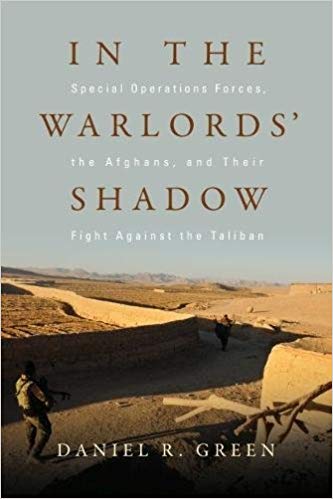In the Warlords’ Shadow, written by Daniel Green, examines the effect of the Village Stability Operations program in the fight against the Taliban insurgency in southern Afghanistan. This first hand account gives a detailed explanation of the challenges faced by U.S. Special Forces embedded throughout Uruzgan province and how they were able to achieve success. In the Warlords’ Shadow is part memoire, part strategic analysis and part in-depth study of the techniques and procedures used to conduct counter-insurgency operations by U.S. Special Forces post 2010.
Green has been intensely involved with Afghanistan throughout his professional life. He completed five operational tours in the Middle East, studied and developed Afghan policy in Washington D.C. and has authored several books on counter-insurgency operations. This experience has given Green a unique perspective; he has a thorough understanding of the strategic situation in Afghanistan as well as first-hand lessons gained from immersion in the local environment.
Although the book begins with a brief analysis on the effectiveness of the “warlord” strategy used by Coalition forces in the mid – 2000s, In the Warlords’ Shadow is primarily a chronological account of Green’s 2012 tour of Afghanistan. Embedded with U.S. SEALs charged with implementing the Village Stability Operations program in Uruzgan province,Green uses a mixture of personal accounts and analysis to describe why the Village Stability Operations program was so effective.
In the Warlords’ Shadow is forthright in its criticism of U.S. Strategy in Afghanistan over the past 16 years. Green alludes to several flaws in contemporary thinking behind counter-insurgency operations and the manner in which they have been carried out. By using what was being done to, rather than by, the local population as metrics for success, military and government leaders have tended to view the problems in Afghanistan through a single lens pertaining to their own organisation. Civil-military divisions and a bureaucratic top-down approach are other themes explored by Green as to why previous counter-insurgency efforts have not been successful prior to the introduction of the Village Stability Operations program.
Used in conjunction with the Afghan Local Police initiative, the two programs were key in undermining crucial power sources of the Taliban in Uruzgan province. By mitigating the exploitation of local tribal, political and factional friction points by the Taliban, embedded U.S. Special Forces were able to bring security and self-reliance to a wide range of villages. Key lessons from the experience of the U.S. Special Forces in the Village Stability Operations program highlight the prevailing requirement for counter-insurgency for counter-insurgency operations to be population centric, enduring and have a bottom-up approach. Ultimately, the Village Stability Operations program and Afghan Local Police initiative enabled Coalition forces to turn Uruzgan province from a former Taliban stronghold into a model counter-insurgency.
In the Warlords’ Shadow mixes analysis of U.S. strategy with a thorough explanation of the methods used in the Village Stability Operations program through in-depth personal accounts. While Green’s personal vignettes provides the reader with a better understanding of the tribal and political structures of southern Afghanistan, the detailed descriptions of the numerous shuras, forward operating bases and side-stories does become somewhat repetitive and at times detracts from the narrative of the book.
In the Warlords’ Shadow offers a comprehensive review of how the unique techniques and procedures developed by U.S. Special Forces aided in overcoming the Taliban in Uruzgan province; methods that would ultimately change the way in which coalition forces would fight in Afghanistan. Green provides a frank examination into previous and contemporary methods of counter-insurgency operations in Afghanistan. This book is recommended to anyone interested in counter-insurgency operations, Special Operations methodology or strategy in Afghanistan.
About the Author
Nicholas Waugh is an Artillery officer in the Australian Army and an Associated Editor of Grounded Curiosity. He holds a Bachelor in Politics and a Masters in Strategy and Security from the University of New South Wales.

